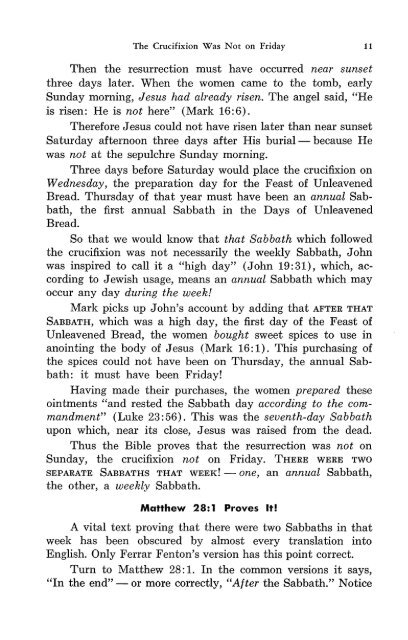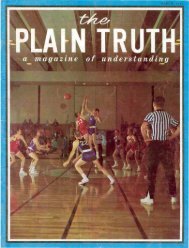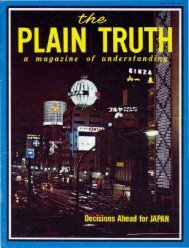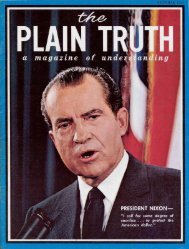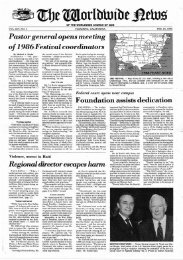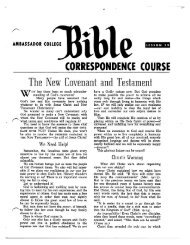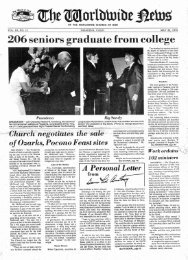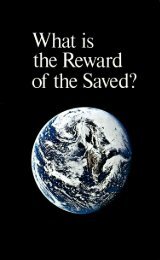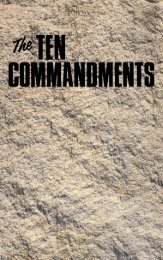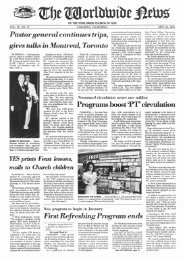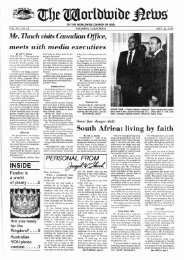Crucifixion Was Not on Friday (1968)_b.pdf - Herbert W. Armstrong
Crucifixion Was Not on Friday (1968)_b.pdf - Herbert W. Armstrong
Crucifixion Was Not on Friday (1968)_b.pdf - Herbert W. Armstrong
Create successful ePaper yourself
Turn your PDF publications into a flip-book with our unique Google optimized e-Paper software.
The <str<strong>on</strong>g>Crucifixi<strong>on</strong></str<strong>on</strong>g> <str<strong>on</strong>g>Was</str<strong>on</strong>g> <str<strong>on</strong>g>Not</str<strong>on</strong>g> <strong>on</strong> <strong>Friday</strong> 11<br />
Then the resurrecti<strong>on</strong> must have occurred near sunset<br />
three days later. When the women came to the tomb, early<br />
Sunday morning, Jesus had already risen. The angel said, "He<br />
is risen: He is not here" (Mark 16:6).<br />
Therefore Jesus could not have risen later than near sunset<br />
Saturday afterno<strong>on</strong> three days after His burial- because He<br />
was not at the sepulchre Sunday morning.<br />
Three days before Saturday would place the crucifixi<strong>on</strong> <strong>on</strong><br />
Wednesday, the preparati<strong>on</strong> day for the Feast of Unleavened<br />
Bread. Thursday of that year must have been an annual Sabbath,<br />
the first annual Sabbath in the Days of Unleavened<br />
Bread.<br />
So that we would know that that Sabbath which followed<br />
the crucifixi<strong>on</strong> was not necessarily the weekly Sabbath, John<br />
was inspired to call it a "high day" (John 19:31), which, according<br />
to Jewish usage, means an annual Sabbath which may<br />
occur any day during the week!<br />
Mark picks up John's account by adding that AFTER THAT<br />
SABBATH, which was a high day, the first day of the Feast of<br />
Unleavened Bread, the women bought sweet spices to use in<br />
anointing the body of Jesus (Mark 16: 1). This purchasing of<br />
the spices could not have been <strong>on</strong> Thursday, the annual Sabbath:<br />
it must have been <strong>Friday</strong>!<br />
Having made their purchases, the women prepared these<br />
ointments "and rested the Sabbath day according to the commandment"<br />
(Luke 23: 56). This was the seventh-day Sabbath<br />
up<strong>on</strong> which, near its close, Jesus was raised from the dead.<br />
Thus the Bible proves that the resurrecti<strong>on</strong> was not <strong>on</strong><br />
Sunday, the crucifixi<strong>on</strong> not <strong>on</strong> <strong>Friday</strong>. THERE WERE TWO<br />
SEPARATE SABBATHS THAT WEEK! - <strong>on</strong>e, an annual Sabbath,<br />
the other, a weekly Sabbath.<br />
Matthew 28:1 Proves It!<br />
A vital text proving that there were two Sabbaths in that<br />
week has been obscured by almost every translati<strong>on</strong> into<br />
English. Only Ferrar Fent<strong>on</strong>'s versi<strong>on</strong> has this point correct.<br />
Turn to Matthew 28: 1. In the comm<strong>on</strong> versi<strong>on</strong>s it says,<br />
"In the end" - or more correctly, "After the Sabbath." <str<strong>on</strong>g>Not</str<strong>on</strong>g>ice


